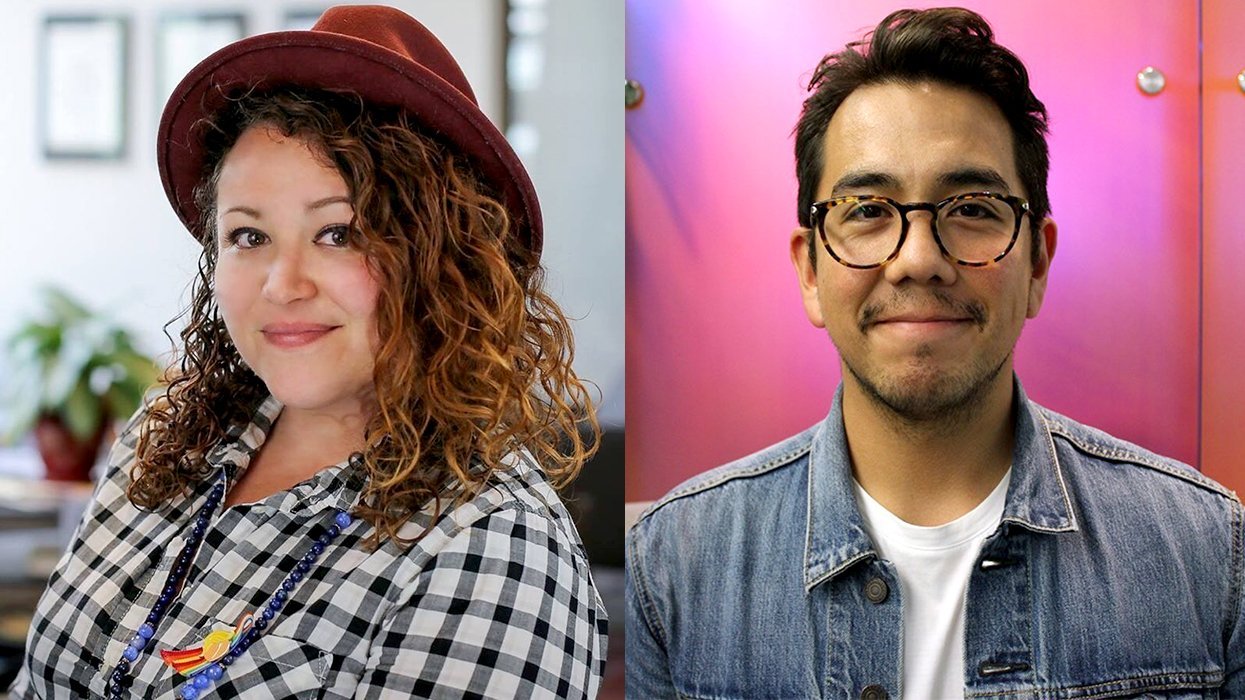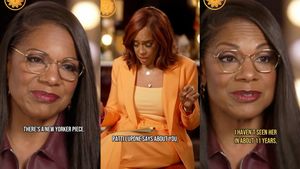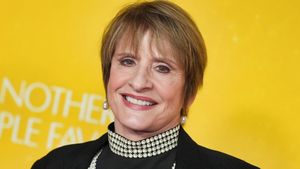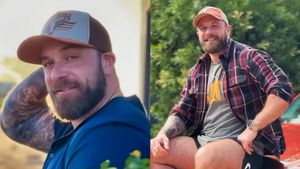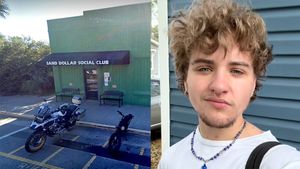As the nation observes the sixth annual National Gun Violence Survivors Week, stories of survivors echo a poignant reminder of the ongoing crisis in America. National Gun Violence Survivors Week not only highlights personal stories but also casts a spotlight on the broader impact of gun violence in America. According to Everytown for Gun Safety, an average year witnesses over 25,000 hate crimes in the U.S. involving a firearm.
Keep up with the latest in LGBTQ+ news and politics. Sign up for The Advocate's email newsletter.
The week also brings to the fore the disproportionate effect of gun violence on the LGBTQ+ community. Amid the backdrop of numerous homicides of transgender people and increasing firearm-related hate crimes and gun suicides, gun violence survivors like Sara Grossman and Vincent Perez share their harrowing journeys of loss, resilience, and advocacy.
“These numbers are harrowing — in no other country in this world do we experience the kind of carnage that we do in America via gun violence,” Grossman tells The Advocate.
Grossman, a Denver-based Moms Demand Action volunteer and senior fellow with the Everytown Survivor Network in Colorado, carries the weight of her friend Drew Leinonen’s death in the Pulse nightclub shooting. Leinonen was one of 49 people killed in the 2016 shooting, and 53 more people who were injured survived. Transforming grief into purpose, she and other friends of Leinonen founded The Dru Project in his honor, creating safe spaces for the LGBTQ+ community.
“I had to really sit and think about what meaning I can return to the world in his honor,” Grossman says.
In Oregon, Perez, who lives in Portland and is also a volunteer and senior fellow with Everytown, faced a life-altering tragedy when his partner, Shane Colombo, fell victim to gun violence.
In 2018, then in Chicago, Colombo, a 25-year-old who had beaten cancer as a teenager, was shot and killed by a stray bullet in the Rogers Park neighborhood just four hours after arriving in the city to start his Ph.D. in clinical psychology at Northwestern University. He was caught in the crossfire of a gun battle while running an errand to buy clothes hangers. Colombo chose Chicago to be with his Perez.
Related: The intersectional approach needed to stem the plague of gun violence in America
“It’s such a multifaceted mind fudge that people just don’t understand,” he says of the trauma of losing Colombo to such violence. Perez now channels his loss into advocacy, emphasizing the importance of mental health and equitable resources in gun law reforms.
As National Gun Violence Survivors Week concludes, the insights shared by Grossman and Perez underscore the larger narrative surrounding gun violence in the LGBTQ+ community, as illuminated by a 2022 Everytown report.
The report revealed that over 25,000 hate crimes involving a firearm occur annually in the U.S., disproportionately affecting queer individuals. LGBTQ+ youth face a significantly higher risk of experiencing weapon-involved bias-motivated violence compared to their non-LGBTQ+ peers. The alarming data, supplemented by research from the Human Rights Campaign, indicated that 17 percent of LGBTQ+ youth had been threatened or harmed with a weapon at school, a figure that rises to 29 percent among trans youth and 30 percent among questioning youth.
Everytown for Gun Safety’s research shows there's been a 93 percent increase in homicides of transgender people from 2017 to 2021. More than 70 percent involved a gun. It's alarming and underscores the specific vulnerabilities faced by the transgender community, particularly Black transgender women. This is part of a broader epidemic of gun violence affecting various segments of the population.
Speaking from his own experience and research, Perez highlights the grim reality this community faces. “There are over 25,000 hate crimes that involve a firearm in the U.S. in general and 69 per day,” he says. He draws particular attention to the specific risks faced by LGBTQ+ individuals. His advocacy work, rooted in his loss, aims to bring about legislative changes that protect not just the LGBTQ+ community but all Americans from what he calls the “scourge of gun violence.”
According to a Pew Research Center analysis from last April, the United States saw the highest number of gun-related deaths in 2021 than any other year on record. This figure included record numbers of both gun murders and gun suicides, emphasizing that the crisis of gun violence is not confined to any single community. In 2021, 54 percent of all gun-related deaths were suicides, while 43 percent were murders, according to the report.
A December report by the Centers for Disease Control and Prevention found a stark and alarming trend: the rate of suicides involving guns in the United States has reached the highest level since record-keeping began over 50 years ago.
In 2022, the rate increased by over 10 percent compared to 2019, with significant disparities among racial and ethnic groups. This increase in firearm suicides coincides with a rise in gun sales during the pandemic, suggesting a correlation between the availability of firearms and an increase in suicide rates, according to the report. The Trevor Project’s 2022 National Survey on LGBTQ Youth Mental Health paints a grim picture of the mental health challenges faced by LGBTQ+ youth, with 45 percent seriously considering suicide. The need for affirming environments is critical, as positive school and home atmospheres have been shown to reduce suicide attempts among LGBTQ+ youth.
The role of misinformation and media literacy in the conversation about gun violence is another crucial aspect, survivors say. Grossman, who has a background in digital communications, emphasizes the need for disseminating accurate information.
“We live in two different worlds right now. A lot of people are really out there just looking for anger-tainment,” she says.
Human Rights Campaign's national press secretary Brandon Wolf, who survived the Pulse shooting, wrote about the loss of his friend Leinonen — the same friend whose killing inspired Grossman's work — in his memoirA Place for Us.
In a statement to The Advocate, Wolf said, “Hate is dangerous; armed hate is deadly. America's gun violence epidemic alongside rising anti-LGBTQ+ violence has devastating impacts on our community – empty seats at dinner tables, missing faces at birthday parties, and the scars of trauma that linger long past the shots that are fired.”
He added: “Whether it was the horrific assault on Pulse nightclub in 2016, the devastating attack at Club Q in 2022, or the ongoing violence being inflicted on LGBTQ+ people across the country, the fight to end gun violence is our fight. This Gun Violence Survivors Week, let's deepen our commitment to that work – and the work of honoring those devastated by it with action.”
Related: Brandon Wolf, Pulse Survivor and Advocate, Joins Human Rights Campaign From Equality Florida
For Grossman, her work with The Dru Project and involvement in Everytown have been lifelines, she says, offering a platform to advocate but also networks of support.
“The survivor group that I joined to become a fellow, some of those people are my closest friends,” she says, stressing the importance of community in healing.
Although Perez is now in a happy and loving relationship, the loss of Colombo will always stay with him, he says. He honors the loss through his involvement as an involuntary member of those touched by gun violence who have been brought into activism.
As National Gun Violence Survivors Week comes to a close, the stories of Grossman and Perez, among many others, continue to resonate. Their voices memorialize those lost and serve as a catalyst for change, demanding action from policymakers and the public to address this critical issue.
“It’s going to always sit with me,” Grossman says.
If you are having thoughts of suicide or are concerned that someone you know may be, resources are available to help. The 988 Suicide & Crisis Lifeline at 988 is for people of all ages and identities. Trans Lifeline, designed for transgender or gender-nonconforming people, can be reached at (877) 565-8860. The lifeline also provides resources to help with other crises, such as domestic violence situations. The Trevor Project Lifeline, for LGBTQ+ youth (ages 24 and younger), can be reached at (866) 488-7386. Users can also access chat services at TheTrevorProject.org/Help or text START to 678678.
